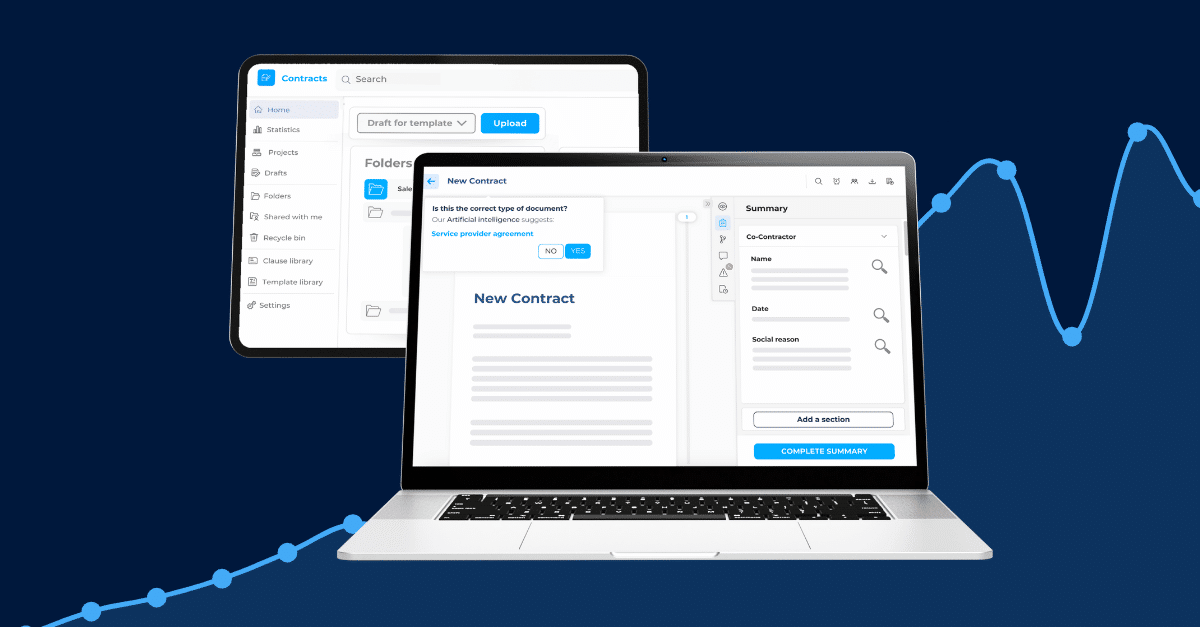A contract repository is a centralized digital solution that streamlines the storage, organization, and management of business agreements. By providing a single source of truth, advanced security, and lifecycle automation, contract repositories reduce operational risk, improve efficiency, and ensure compliance.
Managing contracts effectively has become a critical factor for organizational success. A contract repository serves as the foundation of efficient contract management, offering businesses a centralized location to store, organize, and access all their legal agreements. With the average company managing hundreds or thousands of contracts simultaneously, the need for a structured system has never been more apparent.
What is a Contract Repository?
A contract repository is a centralized digital system designed specifically for storing, organizing, and managing all types of business agreements. Unlike basic document storage solutions that simply hold files, a comprehensive contract repository offers advanced functionality for tracking the entire contract lifecycle, from creation and negotiation to execution and renewal.
The evolution of contract management has transformed dramatically over the past decade. Organizations have moved from paper-based filing systems and scattered digital files to sophisticated contract repository solutions that provide structure, security, and accessibility. This shift reflects the growing recognition that contracts are not merely documents but valuable business assets containing critical information and obligations.
Key Benefits of Implementing a Contract Repository
Implementing a dedicated contract repository delivers multiple advantages that directly impact business operations and outcomes.
Centralized Access and Improved Efficiency
A contract repository eliminates the fragmentation of contracts across departments, creating a single source of truth for all agreements. This centralized approach allows authorized team members to access contracts from anywhere, significantly reducing the time spent searching for documents. Legal teams, sales departments, and financial services units all benefit from immediate access to the information they need.
Enhanced Security and Compliance
Security remains a top priority when dealing with sensitive contractual information. Modern contract repositories offer robust security features including role-based access controls, encryption, and comprehensive audit trails. These protections ensure that confidential terms, pricing details, and proprietary information remain secure while still being accessible to authorized users.
Additionally, contract repositories help organizations maintain compliance with industry regulations and internal policies by standardizing contract processes and providing visibility into contractual obligations.
Streamlined Contract Lifecycle Management
A sophisticated contract repository goes beyond simple storage to support the entire contract lifecycle. From standardized templates for contract creation to automated workflows for approval and execution, these systems transform contract management from a reactive to a proactive process. Automated alerts for key dates such as renewals, expirations, and compliance deadlines ensure nothing falls through the cracks.
Essential Features to Look for in a Contract Repository Solution
When evaluating contract repository options, certain features stand out as particularly valuable for optimizing contract management processes.
Advanced Search Functionality
The ability to quickly find specific contracts or clauses is fundamental to an effective repository. Advanced search capabilities allow users to locate documents based on multiple criteria including contract type, party names, dates, values, and even specific language within the agreements.
Version Control and Document History
Contract negotiations often involve multiple revisions before reaching final agreements. A quality repository maintains a complete history of each document, tracking changes, approvals, and providing the ability to compare different versions. This feature proves invaluable for understanding how agreements evolved and for audit readiness.
Integration Capabilities
The most effective contract repositories don’t exist in isolation but integrate seamlessly with other business systems such as CRM platforms, financial software, and e-signature tools. These integrations create a connected ecosystem that eliminates duplicate data entry and ensures consistency across systems.
Analytics and Reporting
Data-driven insights help organizations identify patterns, risks, and opportunities within their contract portfolio. Robust reporting tools provide visibility into contract performance, compliance status, and operational metrics that support strategic decision-making.
Common Challenges Solved by a Contract Repository
Implementing a contract repository addresses several persistent challenges that organizations face in managing their agreements.
Eliminating Contract Silos
Without a centralized repository, contracts often become siloed within departments or individual computers. This fragmentation creates risks when important terms or obligations are unknown to relevant stakeholders. A contract repository breaks down these silos, creating transparency and shared knowledge across the organization.
Preventing Missed Obligations and Opportunities
One of the most costly contract management failures is missing key dates such as renewals, price adjustments, or termination windows. A contract repository with automated alerts ensures these critical deadlines are tracked and addressed proactively, preventing unwanted auto-renewals or missed opportunities to renegotiate terms.
Standardizing Contract Processes
Inconsistent approaches to contract creation and management lead to increased risk and inefficiency. A contract repository establishes standardized workflows, approval processes, and naming conventions that bring discipline to contract management activities.
How to Successfully Implement a Contract Repository
Transitioning to a contract repository requires thoughtful planning and execution to maximize benefits and user adoption.
Migrating Existing Contracts
The first step in implementation involves collecting and digitizing existing contracts. This process includes:
Establishing Best Practices
Successful implementation depends on establishing clear guidelines for how the repository will be used. This includes developing standardized naming conventions, metadata requirements, and folder structures that make contracts easily searchable and accessible.
Ensuring User Adoption
Even the most sophisticated repository delivers limited value if users don’t embrace it. Comprehensive training programs, intuitive user interfaces, and clear communication about the benefits of the new system are essential for driving adoption across the organization.
The Future of Contract Repositories
Contract repository technology continues to evolve, with several emerging trends shaping its future development.
AI-Enhanced Contract Management
Artificial intelligence is transforming contract repositories from passive storage systems to active management tools. AI capabilities include automatic extraction of key terms, risk identification, and even suggesting alternative language during contract creation. These advancements reduce manual review time while improving accuracy and consistency.
Mobile Accessibility
As workforces become increasingly distributed, the ability to access and manage contracts from mobile devices has become essential. Modern contract repositories offer responsive interfaces that allow users to review, approve, and monitor contracts from anywhere.
Blockchain for Contract Verification
Blockchain technology is beginning to appear in contract repositories, offering immutable verification of contract authenticity and execution. This technology provides an additional layer of security and trust, particularly valuable for high-value agreements or those involving multiple parties.
Transforming Contract Management for Business Success
A well-implemented contract repository transforms contract management from an administrative burden to a strategic advantage. By centralizing contracts, automating workflows, and providing visibility into obligations and opportunities, organizations gain control over their contractual relationships and the value they deliver.
For businesses seeking to optimize their legal operations, a contract repository represents an essential investment that pays dividends through reduced risk, improved efficiency, and enhanced decision-making. As contract complexity continues to increase, having a robust system for managing these critical business assets becomes not merely beneficial but necessary for sustainable success.
Ready to evaluate how a contract repository could transform your organization’s approach to contract management? Consider assessing your current processes to identify opportunities for improvement and exploring solutions designed to address your specific needs.



